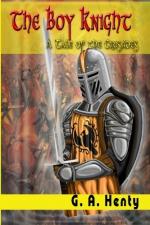Cnut with his archers formed part of the line outside the array of English knights, and the arrows of the English bowmen fell fast as bands of the Bedouin horse circled round them in the endeavor to draw the Christians on to the attack. For some time Saladin persisted in these tactics. With his immense superiority of force he reckoned that if the Christian chivalry would but charge him, the victory of Tiberias would be repeated. Hemmed in by numbers, borne down by the weight of armor and the effects of the blazing sun, the knights would succumb as much to fatigue as to the force of their foes. King Richard’s orders, however, were well obeyed, and at last the Moslem chief, urged by the entreaties of his leading emirs, who felt ashamed that so large a force should hesitate to attack one so vastly inferior in numbers, determined upon taking the initiative, and forming his troops in a semicircle round the Christian army, launched his horsemen to the attack. The instant they came within range a cloud of arrows from the English archers fell among them, but the speed at which the desert horses covered the ground rendered it impossible for the archers to discharge more than one or two shafts before the enemy were upon them. Quickly as they now slipped back and sought refuge under the lances of the knights, many of them were unable to get back in time, and were cut down by the Saracens. The rest crept between the horses or under their bellies into the rear, and there prepared to sally out again as soon as the enemy retired. The Christian knights sat like a wall of steel upon their horses, their lances were leveled, and brave as the Bedouin horsemen were, they felt to break this massive line was impossible. The front line, however, charged well up to the points of the lances, against which they hewed with their sharp scimiters, frequently severing the steel top from the ashpole, and then breaking through and engaging in hand-to-hand conflict with the knights. Behind the latter sat their squires, with extra spears and arms ready to hand to their masters; and in close combat, the heavy maces with their spike ends were weapons before which the light-clad horsemen went down like reeds before a storm.
Hour after hour the Arab horsemen persisted in their attack, suffering heavily, but determined to conquer if possible. Then Saladin suddenly ordered a retreat, and at seeing their enemy fly, the impetuosity of the Crusaders at last broke out. With a shout they dashed after the foe. King Richard, knowing that his followers had already shown a patience far beyond what he could have expected, now headed the onslaught, performing prodigies of valor with his single arm, and riding from point to point to see that all was well.
The early resistance of the infidel host was comparatively slight. The heavy mass of the Christian cavalry, with their leveled lances, swept through the ranks of the light horsemen, and trampled them down like grass beneath their feet; but every moment the resistance became more stubborn.




